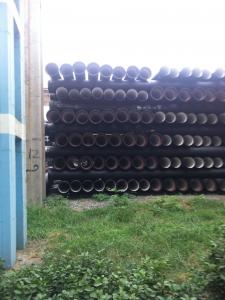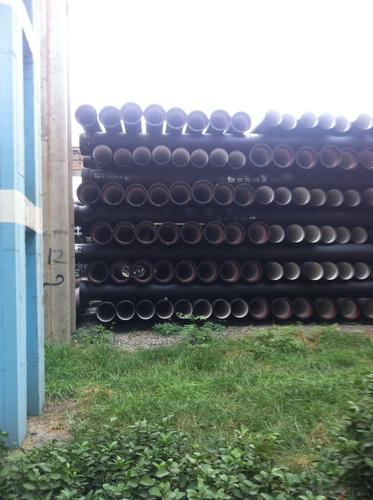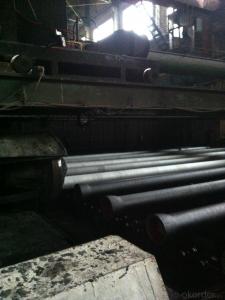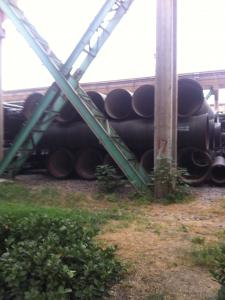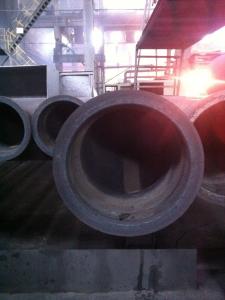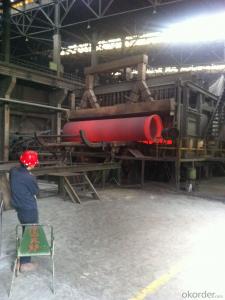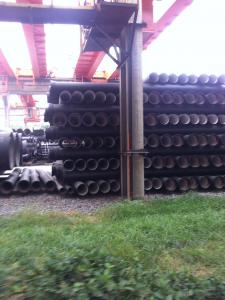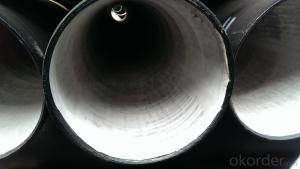DUCTILE IRON PIPES AND PIPE FITTINGS K9 CLASS DN300
- Loading Port:
- Tianjin
- Payment Terms:
- TT OR LC
- Min Order Qty:
- 22 pc
- Supply Capability:
- 3000 pc/month
OKorder Service Pledge
OKorder Financial Service
You Might Also Like
Material : Ductile Cast Iron
Size Range : DN 80mm to DN 2000mm
Unit Effective Length : 6m or 5.7m
Manufacture Standard: ISO 2531:1998/ EN 545:2006/EN 598:2007
Annual capacity : 200,000 tons
Coating Exterior: Zinc 130g/m2 according to ISO 8179-1 and bitumen coating 70 microns.
Cement Interior: Portland Cement/ High Alumina Cement/ Sulphate Resisting Cement Lining according to ISO 4179
Special requirements on external coating and internal lining can be applied
We also provide accessories such as SBR/EPDM rubber gaskets, lubricant paste, pipe caps, PE sleeves, etc.
Additional Parts:
Each pipe is strictly inspected according to related standard to ensure permanently high performance.
Easy Installation at site and service free for life
Long Service Lifespan
Quotation will arrive you within 24hours once we get your inquiry.
We guarantee offering you a competitive price.
A copy of original inspection reports of pipes will be offered after shipment.
Photos of loading process will be sent to the customer after shipment effect.
We will follow-up the delivery progress after shipment effect and update to the customer on weekly basis.
- Q: Are ductile iron pipes suitable for potable water distribution systems?
- Ductile iron pipes are well-suited for the distribution of drinking water in potable water systems. Ductile iron, a form of cast iron, is renowned for its strength and durability, making it an ideal choice for transporting drinking water. These pipes possess corrosion resistance, a crucial factor in preserving the safety and quality of potable water. Moreover, their smooth inner surface helps prevent the accumulation of sediments and biofilms that can negatively impact water quality. Furthermore, they can withstand high pressure and temperature fluctuations, rendering them suitable for diverse potable water distribution systems. In summary, ductile iron pipes are a dependable and widely employed solution for ensuring the provision of safe and uncontaminated drinking water to communities.
- Q: Are ductile iron pipes suitable for horizontal directional drilling (HDD) installations?
- Yes, ductile iron pipes are suitable for horizontal directional drilling (HDD) installations. They possess the necessary strength and flexibility to withstand the drilling process and can be easily installed underground without compromising their structural integrity.
- Q: How are ductile iron pipes manufactured?
- Ductile iron pipes are manufactured through a process known as centrifugal casting, which involves the use of a spinning mold. The process begins with the selection and preparation of high-quality ductile iron, which is a type of cast iron that contains small amounts of magnesium to enhance its strength and ductility. First, the ductile iron is melted in a furnace at extremely high temperatures. Once the molten iron reaches the desired temperature, it is poured into a spinning mold. The spinning mold is designed in the shape of a pipe, and it rotates at a high speed to distribute the molten iron evenly along its inner surface. As the mold spins, the molten iron cools and solidifies against the mold walls. This rapid cooling results in a fine-grained structure and enhances the mechanical properties of the pipe, such as its strength and durability. The spinning mold continues to rotate until the pipe has completely solidified, which typically takes a few minutes. After solidification, the pipe is removed from the mold, and excess material, known as the "skin," is removed. The skin is typically removed by machining or grinding to achieve the desired dimensions and surface finish. Next, the pipe undergoes heat treatment to further enhance its mechanical properties and reduce internal stresses. Once the heat treatment is completed, the pipe is thoroughly inspected for any defects or imperfections. This includes visual inspections, non-destructive testing methods, and pressure testing to ensure the pipe meets the required specifications and standards. If any defects are detected, the pipe may be repaired or rejected depending on the severity of the issue. Finally, the pipes are coated with a protective layer to prevent corrosion and enhance their longevity. This coating can be applied through various methods, such as cement mortar lining, epoxy coating, or zinc coating. Overall, the manufacturing process of ductile iron pipes involves melting the iron, centrifugal casting, cooling, skin removal, heat treatment, inspection, and coating. This process ensures the production of high-quality pipes that possess excellent strength, durability, and resistance to corrosion.
- Q: How are ductile iron pipes protected against interior corrosion?
- Ductile iron pipes are protected against interior corrosion through a process called cement-mortar lining. This involves applying a thick layer of cement mortar to the interior surface of the pipes, which acts as a protective barrier against corrosion caused by the flow of water or other substances. Additionally, corrosion-resistant coatings can also be applied to the pipes to provide further protection.
- Q: Do ductile iron pipes require internal linings or coatings?
- Yes, ductile iron pipes typically require internal linings or coatings in order to prevent corrosion and extend their lifespan.
- Q: What is the expected surge pressure rating of ductile iron pipes?
- The expected surge pressure rating of ductile iron pipes can vary depending on various factors such as the diameter and thickness of the pipe, the type of joint used, and the specific manufacturer's specifications. However, ductile iron pipes are generally designed to withstand surge pressures between 150% to 200% of their working pressure rating. This means that if a ductile iron pipe has a working pressure rating of, for example, 250 psi, it can typically handle surge pressures of up to 375 psi to 500 psi. It is important to consult the manufacturer's specifications and guidelines for accurate surge pressure ratings specific to the ductile iron pipes being used.
- Q: Is there any cast iron pipe used in the fire hose?
- I don't know, I only know that the fire pipes produced by our company is the base tube is a pipe, and then coated with a corrosion and non-toxic, long service life, we are Suzhou Yuyao Pipe Industry Co. Ltd. is a professional production of the manufacturers, oh
- Q: How much is the installation cost of the ductile iron tube?
- Water supply pipe is the first choice, with high cost performance. Compared with the PE pipe, from the installation time, ductile pipe PE pipe installation is simple and rapid, and after the installation of internal and external pressure bearing better tightness and corrosion resistance; from the point of view, ductile pipe sealing better after installation, but also can improve the corrosion resistance through various anti-corrosion methods;
- Q: Can ductile iron pipes be used for rainwater harvesting systems?
- Yes, ductile iron pipes can be used for rainwater harvesting systems. Ductile iron pipes are known for their durability and strength, making them suitable for various applications, including rainwater harvesting. These pipes are resistant to corrosion and can withstand high pressure, which is essential for transporting rainwater from the collection point to storage tanks or distribution systems. Additionally, ductile iron pipes have a long lifespan, reducing the need for frequent replacements and making them a cost-effective choice for rainwater harvesting systems.
- Q: What are the different types of linings available for ductile iron pipe?
- There are several types of linings available for ductile iron pipe, including cement mortar lining, polyethylene lining, and polyurethane lining.
Send your message to us
DUCTILE IRON PIPES AND PIPE FITTINGS K9 CLASS DN300
- Loading Port:
- Tianjin
- Payment Terms:
- TT OR LC
- Min Order Qty:
- 22 pc
- Supply Capability:
- 3000 pc/month
OKorder Service Pledge
OKorder Financial Service
Similar products
Hot products
Hot Searches
Related keywords
